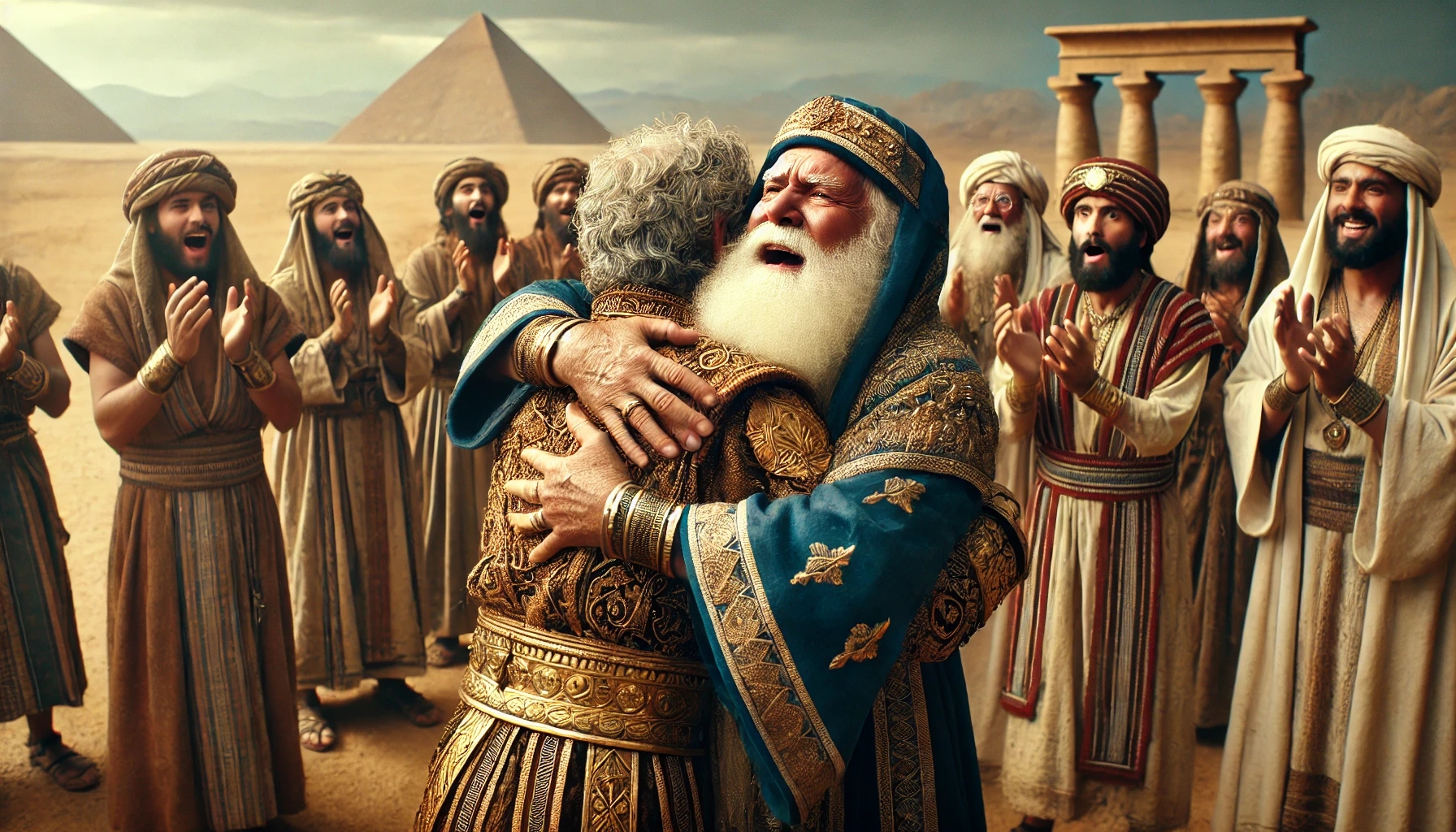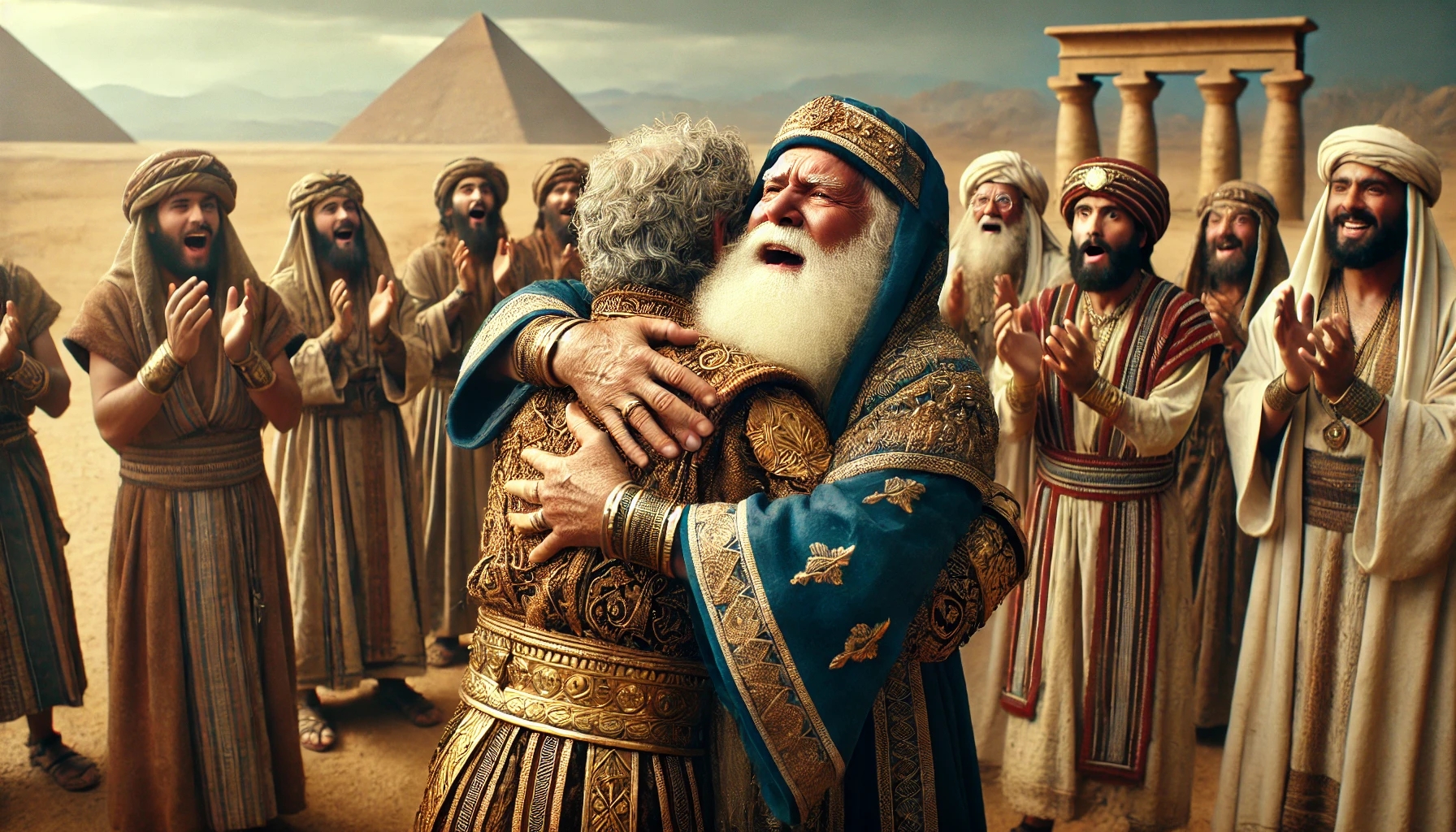 06 August 2025
06 August 2025
 BELIEVE HIS PROPHETS
BELIEVE HIS PROPHETS
 Daily Bible Reading
Daily Bible Reading
 Leviticus 22 – Purity and Perfection in Service to God
Leviticus 22 – Purity and Perfection in Service to God
 Serving God Worthily – Preserving Holiness
Serving God Worthily – Preserving Holiness
══════════════════════════════════════════════
 Bible Text – Leviticus 22 (KJV)
Bible Text – Leviticus 22 (KJV)
1 And the Lord spake unto Moses, saying,
2 Speak unto Aaron and to his sons, that they separate themselves from the holy things of the children of Israel, and that they profane not my holy name in those things which they hallow unto me: I am the Lord.
3 Say unto them, Whosoever he be of all your seed among your generations, that goeth unto the holy things, which the children of Israel hallow unto the Lord, having his uncleanness upon him, that soul shall be cut off from my presence: I am the Lord.
4 What man soever of the seed of Aaron is a leper, or hath a running issue; he shall not eat of the holy things, until he be clean. And whoso toucheth any thing that is unclean by the dead, or a man whose seed goeth from him;
5 Or whosoever toucheth any creeping thing, whereby he may be made unclean, or a man of whom he may take uncleanness, whatsoever uncleanness he hath;
6 The soul which hath touched any such shall be unclean until even, and shall not eat of the holy things, unless he wash his flesh with water.
7 And when the sun is down, he shall be clean, and shall afterward eat of the holy things; because it is his food.
8 That which dieth of itself, or is torn with beasts, he shall not eat to defile himself therewith; I am the Lord.
9 They shall therefore keep mine ordinance, lest they bear sin for it, and die therefore, if they profane it: I the Lord do sanctify them.
10 There shall no stranger eat of the holy thing: a sojourner of the priest, or an hired servant, shall not eat of the holy thing.
11 But if the priest buy any soul with his money, he shall eat of it, and he that is born in his house: they shall eat of his meat.
12 If the priest’s daughter also be married unto a stranger, she may not eat of an offering of the holy things.
13 But if the priest’s daughter be a widow, or divorced, and have no child, and is returned unto her father’s house, as in her youth, she shall eat of her father’s meat: but there shall be no stranger eat thereof.
14 And if a man eat of the holy thing unwittingly, then he shall put the fifth part thereof unto it, and shall give it unto the priest with the holy thing.
15 And they shall not profane the holy things of the children of Israel, which they offer unto the Lord;
16 Or suffer them to bear the iniquity of trespass, when they eat their holy things: for I the Lord do sanctify them.
17 And the Lord spake unto Moses, saying,
18 Speak unto Aaron, and to his sons, and unto all the children of Israel, and say unto them, Whatsoever he be of the house of Israel, or of the strangers in Israel, that will offer his oblation for all his vows, and for all his freewill offerings, which they will offer unto the Lord for a burnt offering;
19 Ye shall offer at your own will a male without blemish, of the beeves, of the sheep, or of the goats.
20 But whatsoever hath a blemish, that shall ye not offer: for it shall not be acceptable for you.
21 And whosoever offereth a sacrifice of peace offerings unto the Lord to accomplish his vow, or a freewill offering in beeves or sheep, it shall be perfect to be accepted; there shall be no blemish therein.
22 Blind, or broken, or maimed, or having a wen, or scurvy, or scabbed, ye shall not offer these unto the Lord, nor make an offering by fire of them upon the altar unto the Lord.
23 Either a bullock or a lamb that hath any thing superfluous or lacking in his parts, that mayest thou offer for a freewill offering; but for a vow it shall not be accepted.
24 Ye shall not offer unto the Lord that which is bruised, or crushed, or broken, or cut; neither shall ye make any offering thereof in your land.
25 Neither from a stranger’s hand shall ye offer the bread of your God of any of these; because their corruption is in them, and blemishes be in them: they shall not be accepted for you.
26 And the Lord spake unto Moses, saying,
27 When a bullock, or a sheep, or a goat, is brought forth, then it shall be seven days under the dam; and from the eighth day and thenceforth it shall be accepted for an offering made by fire unto the Lord.
28 And whether it be cow, or ewe, ye shall not kill it and her young both in one day.
29 And when ye will offer a sacrifice of thanksgiving unto the Lord, offer it at your own will.
30 On the same day it shall be eaten up; ye shall leave none of it until the morrow: I am the Lord.
31 Therefore shall ye keep my commandments, and do them: I am the Lord.
32 Neither shall ye profane my holy name; but I will be hallowed among the children of Israel: I am the Lord which hallow you,
33 That brought you out of the land of Egypt, to be your God: I am the Lord.
══════════════════════════════════════════════
 Introduction
Introduction
In Leviticus 22, God speaks through Moses to Aaron, his sons, and all Israel about how to handle holy things and the requirements for offerings. The passage makes it clear: God is holy, and service to Him must be carried out in purity, reverence, and without compromise. The chapter links two main themes: the personal purity of the priests and the flawless condition of the offerings.
God shows that access to holy things and the offering itself are not arbitrary – both express His holiness and His authority.
══════════════════════════════════════════════
 Commentary
Commentary
 1. Holiness in Handling Holy Things (vv. 1–16)
1. Holiness in Handling Holy Things (vv. 1–16)
-
Command to Aaron and his sons: Priests were not to approach the sacred offerings brought by Israel if they were ceremonially unclean.
-
Types of uncleanness: Leprosy, bodily discharges, contact with the dead, seminal emission, contact with unclean animals or people – all rendered a priest unclean.
-
Purification requirement: After ritual washing and sunset, the priest could again partake of the holy food.
-
Protection from desecration: Foreigners, hired workers, or married priest’s daughters could not eat the holy offerings, except in special household circumstances.
-
Consequence for violation: Unauthorized eating required restitution plus a penalty, and brought guilt.
-
Spiritual truth: Access to God and His holy things requires purity – outwardly in the old covenant, spiritually today through the blood of Jesus (cf. Heb. 10:19–22).
 2. Perfection of the Offerings (vv. 17–25)
2. Perfection of the Offerings (vv. 17–25)
-
Acceptable offerings: Only male animals without defect – from cattle, sheep, or goats – could be presented as burnt or thank offerings.
-
Disqualifying defects: Blindness, injury, open wounds, skin disease, or deformity made an animal unfit.
-
No mutilated animals: Castrated or maimed animals could not be offered.
-
Spiritual truth: The offering was to represent the perfection of Christ – only a flawless sacrifice could be acceptable to God (1 Pet. 1:19).
 3. Additional Sacrifice Laws (vv. 26–33)
3. Additional Sacrifice Laws (vv. 26–33)
-
Minimum age: An animal had to be at least eight days old before being sacrificed.
-
Mother and young: Could not be killed on the same day – a command showing mercy.
-
Thank offerings: Had to be eaten the same day.
-
Purpose of all commands: God’s holy name was not to be profaned, but sanctified among His people.
-
Spiritual truth: God’s commands unite holiness and compassion – His law reflects His character.
══════════════════════════════════════════════
 Summary
Summary
Leviticus 22 emphasizes:
-
Purity is necessary in handling holy things.
-
Perfection is required for offerings presented to God.
-
Reverence for God’s holy name must shape His people’s actions.
══════════════════════════════════════════════
 Message for Us Today
Message for Us Today
Through Jesus Christ, we have access to the Holy Place (Heb. 10:19–22). Yet this access is not casual – it calls us to live in purity, obedience, and reverence.
God deserves our very best, not what is flawed or half-hearted. Our “offerings” today are our praise, our gratitude, and our whole way of life (Rom. 12:1).
Holiness also means honoring God in daily life and making a clear distinction between what is consecrated to Him and what is common.
══════════════════════════════════════════════
 Reflection Questions
Reflection Questions
“Don’t give God what’s left over – give Him the best, pure and whole.”
~~~~~  ~~~~~
~~~~~
 August 3 – 9, 2025
August 3 – 9, 2025
 BELIEVE HIS PROPHETS
BELIEVE HIS PROPHETS
 Weekly Reading from the Spirit of Prophecy
Weekly Reading from the Spirit of Prophecy
 Ellen White | Patriarchs and Prophets – Chapter 21
Ellen White | Patriarchs and Prophets – Chapter 21
 Joseph and His Brothers
Joseph and His Brothers
 Read online here
Read online here
 Introduction
Introduction
The life story of Joseph is a powerful testimony of how God uses human evil to bring about good. Betrayed, sold, slandered, and forgotten—yet exalted, used, and blessed. In his reunion with his brothers, forgiveness, character growth, and divine providence reach a moving climax in biblical history.
══════════════════════════════════════════════
 Commentary
Commentary
 1. Foresight and Responsibility (Genesis 41)
1. Foresight and Responsibility (Genesis 41)
Joseph uses his God-given gift of dream interpretation to prepare Egypt for a coming famine. Despite his rise to power, he remains humble: “God will give Pharaoh an answer of peace.”
 2. Famine Strikes Canaan (Genesis 42)
2. Famine Strikes Canaan (Genesis 42)
The brothers travel to Egypt, unaware they are standing before Joseph. He recognizes them—they do not recognize him. Joseph tests them, not for revenge, but to reveal the change in their hearts.
God uses trials to uncover what lies deep within us.
 3. Repentance, Responsibility, and Change (Genesis 43–44)
3. Repentance, Responsibility, and Change (Genesis 43–44)
The once hard-hearted brothers show depth of character: Judah offers himself in place of Benjamin. One of the most moving moments in Scripture—proof of genuine transformation.
 4. Reconciliation and God’s Plan (Genesis 45)
4. Reconciliation and God’s Plan (Genesis 45)
Joseph reveals his identity: “I am Joseph!” He sees God’s hand in all that has happened. No bitterness—only healing.
Forgiveness is not weakness; it is the greatest evidence of divine love.
 5. Jacob Moves to Egypt (Genesis 46–47)
5. Jacob Moves to Egypt (Genesis 46–47)
God Himself confirms Jacob’s journey. In Goshen, the people of Israel are preserved, set apart, and provided for—a place of preparation.
 6. Blessings and Prophetic Words (Genesis 48–49)
6. Blessings and Prophetic Words (Genesis 48–49)
Jacob blesses his sons—prophetically, wisely, justly. Judah receives the messianic promise, Joseph the double portion.
 7. The Death of Joseph – and a Look Ahead (Genesis 50)
7. The Death of Joseph – and a Look Ahead (Genesis 50)
Joseph dies, but his hope lives on: “God will surely visit you.”
He knows Egypt is not the homeland. The exodus will come.
══════════════════════════════════════════════
 Summary
Summary
Joseph’s story is a bridge from Canaan to Egypt—and ultimately a picture of redemption.
It shows how God brings His plan to fulfillment, even through human failure.
It is full of transformation, reconciliation, and trust in divine providence.
══════════════════════════════════════════════
 Message for Us Today
Message for Us Today
God is sovereign, even when people act unjustly.
Reconciliation heals generational wounds. Joseph could have sought revenge but chose forgiveness.
Your story does not end in pain. God continues to write—with hope, comfort, and a greater perspective.
True greatness is revealed in humility. Joseph remained a servant—even as a ruler.
Trials reveal your character. The brothers passed the test. What trials are shaping you today?
══════════════════════════════════════════════
 Reflection Question
Reflection Question
-
Have you ever experienced injustice that God later turned into something good?
-
Is there someone you need to forgive—not because they deserve it, but because God is calling you to freedom?
-
Do you live with the awareness that you are a “stranger” in this world, on a journey toward your true home?
-
What role does God’s providence play in how you view suffering, success, and the way you live your life?
Talk to God:
“Lord, I don’t always understand Your way—but I trust Your plan.”
══════════════════════════════════════════════
LuxVerbi | The light of the Word. The clarity of faith.

 August 6, 2025
August 6, 2025 Joseph – Faith That Endures
Joseph – Faith That Endures 12.When You Do Good and Get Punished
12.When You Do Good and Get Punished Introduction
Introduction Devotional
Devotional What We Can Learn from Joseph
What We Can Learn from Joseph Reflection – What Does This Mean for You?
Reflection – What Does This Mean for You? Story – “The Teacher Who Was Suspended”
Story – “The Teacher Who Was Suspended” Lessons from the Story
Lessons from the Story Application
Application Prayer
Prayer Blessing to Close
Blessing to Close
 THE SECOND BOOK OF MOSES
THE SECOND BOOK OF MOSES Lesson 6: Through the Red Sea
Lesson 6: Through the Red Sea 6.3 Crossing the Red Sea
6.3 Crossing the Red Sea When Faith Is Put to the Test
When Faith Is Put to the Test Introduction
Introduction Bible Study – Historical and Spiritual Context
Bible Study – Historical and Spiritual Context  1. God’s Leading – Not Chance, but Plan
1. God’s Leading – Not Chance, but Plan Question 1: Read Exodus 13:17–14:12. How did God lead the Israelites when they left Egypt? What happened afterward?
Question 1: Read Exodus 13:17–14:12. How did God lead the Israelites when they left Egypt? What happened afterward? Practical Life Application
Practical Life Application Conclusion
Conclusion Thought of the Day
Thought of the Day Illustration – “The Bridge No One Saw”
Illustration – “The Bridge No One Saw” 05 August 2025
05 August 2025 BELIEVE HIS PROPHETS
BELIEVE HIS PROPHETS Daily Bible Reading
Daily Bible Reading Leviticus 21 – Holiness in the Priesthood – God’s Standard for His Servants
Leviticus 21 – Holiness in the Priesthood – God’s Standard for His Servants Called to purity because we serve the Holy One
Called to purity because we serve the Holy One Bible Text – Leviticus 21 (KJV)
Bible Text – Leviticus 21 (KJV) Introduction
Introduction Commentary
Commentary 1. The special responsibility of the priests (verses 1–6)
1. The special responsibility of the priests (verses 1–6) Summary
Summary Message for Us Today
Message for Us Today Reflection Questions
Reflection Questions
 Ellen White | Patriarchs and Prophets – Chapter 21
Ellen White | Patriarchs and Prophets – Chapter 21 Joseph and His Brothers
Joseph and His Brothers Read online
Read online  1. Foresight and Responsibility (Genesis 41)
1. Foresight and Responsibility (Genesis 41) Reflection Question
Reflection Question August 5, 2025
August 5, 2025 Joseph – Faith That Endures
Joseph – Faith That Endures 11.Flee from Sin – Not from God
11.Flee from Sin – Not from God Introduction
Introduction Devotional
Devotional What We Can Learn from Joseph
What We Can Learn from Joseph Reflection – What Does This Mean for You?
Reflection – What Does This Mean for You? Story – “The Invitation That Could Have Changed Everything”
Story – “The Invitation That Could Have Changed Everything” Lessons from the Story
Lessons from the Story Application
Application Prayer
Prayer Blessing to Close
Blessing to Close